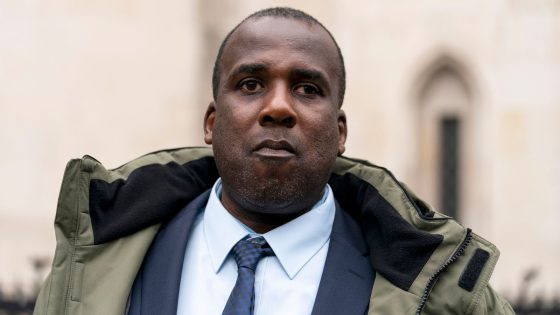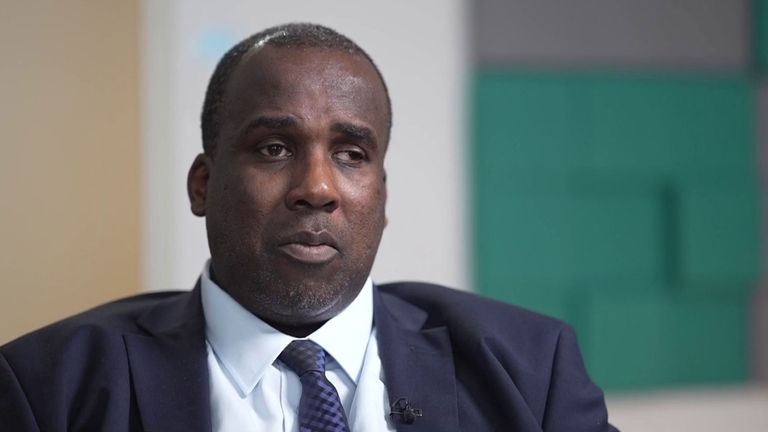There is a “high risk” that a man with learning difficulties was manipulated into falsely confessing to the murder of a shopkeeper, the Court of Appeal has heard.
Oliver Campbell, who suffered brain damage as a baby, was “badgered and bullied” by police into admitting to the killing in 1990, his lawyers said.
Murder victim Baldev Hoondle was shot in the back of the head as he struggled with one of two robbers at his off-licence in Hackney, east London.
After being interviewed by police without a lawyer, Campbell was jailed for life in 1991 for murder and robbery, and was released on licence in 2002.
The 53-year-old, who continues to live under restrictions that mean he needs permission to get a job and is prevented from travelling abroad, is now appealing against his conviction.
It comes after Campbell told Sky News’ Martin Brunt that he was “under duress” when he admitted to the murder.
‘Relentless questioning’
Giving evidence in London on day two of the hearing, forensic psychologist Professor Gisli Hannes Gudjonsson said there was a “high risk” that Campbell, showing “acquiescence” to “relentless” questioning, wrongly admitted to the crime.
He told the court on Thursday: “It was not clear to [Campbell] that the police thought he had done it, and he was claiming he had not done it, and basically, it came to a point that resistance was breaking down.
“He was giving the police what he thought they wanted, believing that he might then get out or they may stop interrogating him.
“The mindset is, there is relentless questioning, how can I stop them questioning me? How can I get them off my back?”
Read more from Sky News:
Sarah Everard’s killer ‘should never have been an officer’
Father of boy who murdered Brianna Ghey jailed for sex offences
Drug addict found guilty of strangling father-of-three to death
Prof Gudjonsson added that he “can’t say whether this is a false confession or not, it is not for me to say”.
But he added: “I am looking at the science, and the science tells me that there are several cumulative risk factors that increase the likelihood of this being a false confession.”
The forensic psychologist also noted during the hearing that Campbell was interviewed 14 times by police during the investigation, including many times without a solicitor or appropriate adult, which he said was “seriously problematic”.
“The techniques [of questioning] that were used carry a very high risk. They were dangerous,” he said. “These kinds of manipulations do significantly increase the risk of a false confession.”
‘Nonsense’ answers
Campbell was 21 when he was convicted. A British Knights baseball cap he bought days before the killing was found near the scene in Hackney, but hairs found inside it did not belong to him.
Speaking on Wednesday, barrister Michael Birnbaum KC said that Eric Samuels – Campbell’s co-defendant who has since died – had “told people over 10 years that Oliver was not with him in the robbery”.
Samuels was cleared of murder but jailed for five years after admitting to robbery.
Campbell’s lawyer noted that Samuel’s admissions were deemed “inadmissible hearsay” and not presented to jurors at trial and said officers may have “deliberately lied” to Campbell to adduce confessions.
Mr Birnbaum also described his client’s answers to police questioning as “simply absurd”, “nonsense” and containing a “litany of inconsistencies” against the facts of the case.
He told the court on Wednesday: “The reason for the nonsense of Oliver’s confession were simply because he was not there, and did not know the details of what happened.”
‘I felt vulnerable’
Before the appeal hearing, Campbell told Sky’s Martin Brunt he felt under huge pressure when he was interviewed by detectives.
He said: “It was like someone putting you in a room and there’s no way out of it. I felt vulnerable, 100%.
“If they had done their homework they would have realised I was wrongly arrested, wrongly convicted and wrongly jailed.”
His lawyers also told Sky News: “Oliver suffered severe brain damage as a baby.
“His intelligence is borderline defective with an impaired capacity to process or remember more than the simplest verbal information, severely restricted reasoning skills and poor concentration and memory.”
Proceedings were adjourned on Thursday.
The Crown Prosecution Service, which is resisting the appeal brought to the court by the Criminal Cases Review Commission, will make its submissions at a future hearing.
Source Agencies





